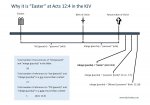Umm. If you really wanted to trace back the word Easter then you have to look on the Bible as the Final Authority. Easter in reference to East which we are pre-conditioned that the sun rises at the east. Christ, the Sun of righteousness will arise with healing in his wings and the day dawn will shine, soon will arise in your hearts. Actually, we have also a more sure word of prophecy which will bring to light about the subject.
Mal_4:2 But unto you that fear my name shall the Sun of righteousness arise with healing in his wings; and ye shall go forth, and grow up as calves of the stall.
2Pe_1:19 We have also a more sure word of prophecy; whereunto ye do well that ye take heed, as unto a light that shineth in a dark place, until the day dawn, and the day star arise in your hearts:
Consider if there is a true gospel, there is a false gospel, if there are true apostles of Christ, there are also false apostles etc. so that if Christ is the “day-star” then enter Astoreth/Astaroth the impersonator, The false, the fake one. Indeed the Bible has the answer.
Deu_1:4 After he had slain Sihon the king of the Amorites, which dwelt in Heshbon, and Og the king of Bashan, which dwelt at
Astaroth in Edrei:
Easton's Bible Dictionary
Ashtoreth
The moon goddess of the Phoenicians, representing the passive principle in nature, their principal female deity; frequently associated with the name of Baal, the sun-god, their chief male deity (Judges 10:6; 1 Samuel 7:4; 12:10). These names often occur in the plural (Ashtaroth, Baalim), probably as indicating either different statues or different modifications of the deities. This deity is spoken of as Ashtoreth of the Zidonians. She was the Ishtar of the Accadians and the Astarte of the Greeks (Jeremiah 44:17; 1 Kings 11:5, 33; 2 Kings 23:13). There was a temple of this goddess among the Philistines in the time of Saul (1 Samuel 31:10). Under the name of Ishtar, she was one of the great deities of the Assyrians. The Phoenicians called her Astarte. Solomon introduced the worship of this idol (1 Kings 11:33). Jezebel's 400 priests were probably employed in its service (1 Kings 18:19). It was called the "queen of heaven" (Jeremiah 44:25).
Herewith is a link who is Astarte/Astaroth etc. as an outside reference and hope this will settle Ostern, Easter Ishtar, Astarte, EAST Star etc. that there is really indeed genuine and a fake one.
https://en.m.wikipedia.org/wiki/Astarte
Consider also this:
In Tagalog, pasha, paska, pascha paques, passoever, easter etc. is equivalent to “pasko” and “pasko” can be used either “pasko ng kapanangakan” usually in reference to the birth of our Lord Jesus Christ hence, the tagalog word “kapanangkan” in English is “birth” or “pasko ng pagkabuhay” which literally means the resurrection of the Lord Jesus Christ.
So it is fair to say that the translation must consider the context and which do not contradict itself.
1



